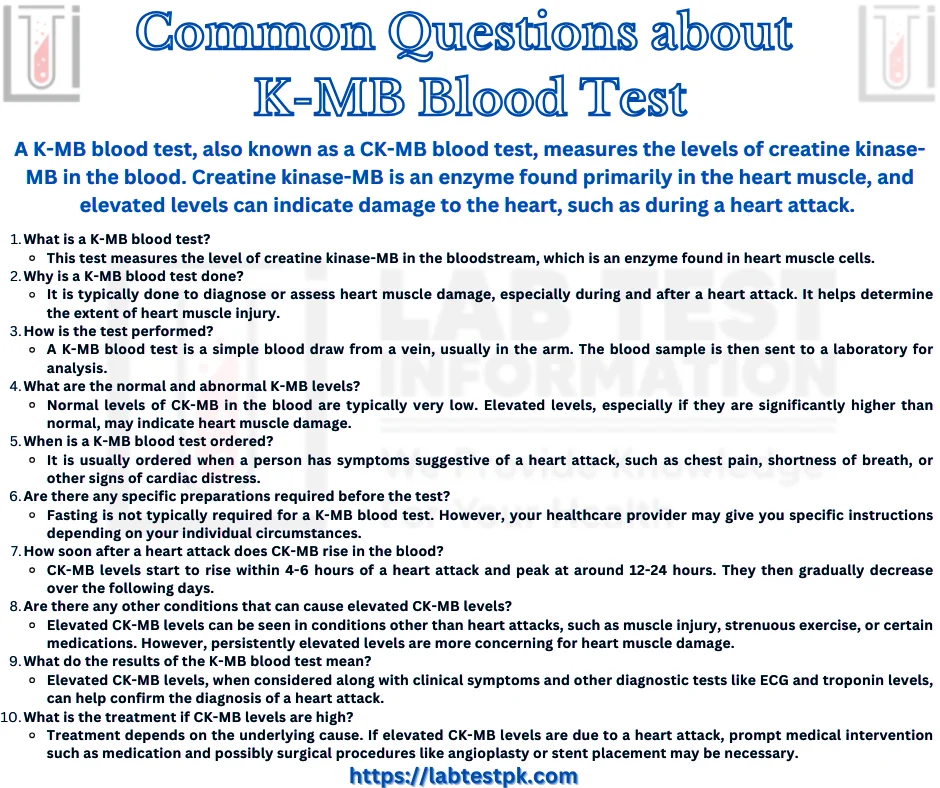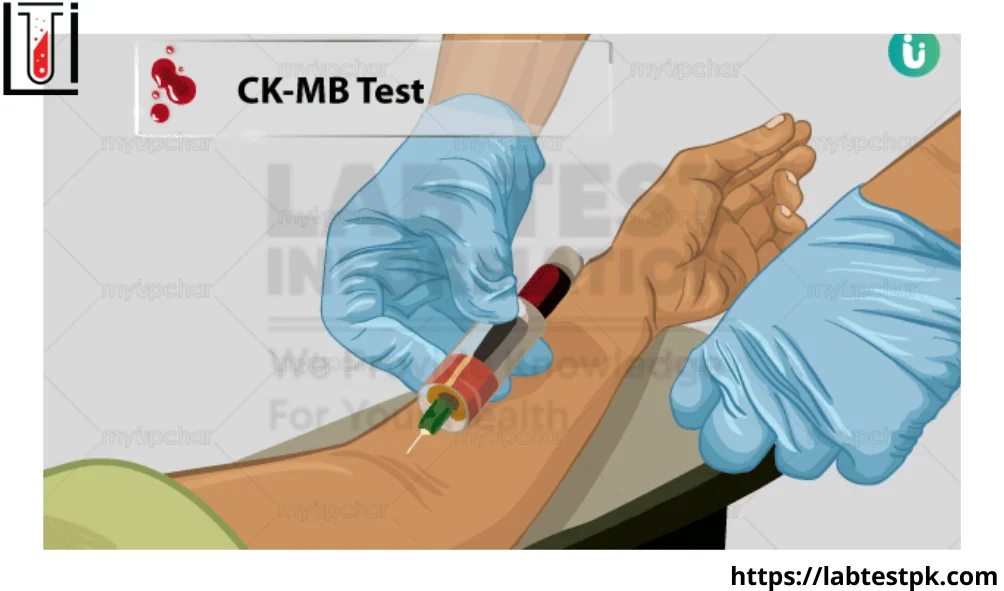CK-MB Blood Test
CK-MB Blood Test, CK-MB is an isoenzyme of CK or CPK ( creatine Kinase or Creatine Phosphokinase ). It is mostly found in heart muscle cells. An increase in CK- MB can usually be detected about 3-6 hours after a heart attack. CK-MB peaks in 12 – 24 hours and then returns to normal in about 48-72 hours. If there is a second heart attack or sustained damage, then the level may rise again and stay higher for a longer period of time.
Purpose of CK-MB Test
- When a person has chest pain, left arm and jaw pain, shortness of breath, and tiredness then Doctors want to decide Whether the pain is caused by a heart attack then CK-MB Test is usually ordered.
- CK-MB test is ordered when the most specific test for heart attack Troponin is not available.
- When a person has high CK or CPK and to determine Whether the muscle damage is in the heart or other muscles the CK test will be ordered.
Normal Ranges of CK-MB Test
5 to 25 IU/L OR Less than 24 U/L
Causes of High CK-MB in Blood
- Kidney Failure
- Recent Heart Attack
- Chronic Alcoholism
- Myocardial and Pericarditis
- High T3 and T4 Levels also cause High CK-MB
Specimen Collection For CK-MB Test
Collect the blood sample in a test tube. Centrifuge the blood sample and separate the blood.
PREPARATION, STORAGE AND STABILITY
- Reagents 1 and 2 are ready to use. Mix reagent R1 and reagent R2 in the ratio of 4:1 respectively to prepare the derived volume of working reagent prior to use.
- Do not shake vigorously.
- The working reagent is stable for 14 days at 2-8 degrees centigrade.
- The reagent kit should be stored at 2-8 degrees centigrade and stable till the expiry date on the table.
- Do not use of hemolysed sample.
Test Parameters
- Name CK-MB
- Reaction Type UV kinetic
- Wavelength 340 nm
- Blank Setting D.W
- Sample vol. 50microliter
- Incubation 37 C
- Delay Time 300 sec
- Read Time 120 sec
Why do I need a CK-MB Blood Test:
This test is primarily performed to assess the health of your heart muscle (myocardium) and to diagnose or monitor certain heart-related conditions. Here’s why you might need a CK-MB blood test:
- Suspected Heart Attack: The most common reason for a CK-MB blood test is to diagnose a heart attack (myocardial infarction). When heart muscle cells are damaged due to insufficient blood flow (ischemia), they release enzymes like CK-MB into the bloodstream. Elevated CK-MB levels can indicate recent heart muscle damage.
- Monitoring Cardiac Health: If you’ve had a heart attack or have been diagnosed with a heart condition, your healthcare provider may use CK-MB testing to monitor your cardiac health and assess the effectiveness of treatments or interventions.
- Chest Pain: If you’re experiencing chest pain or other symptoms that could be related to heart problems, your doctor may order a CK-MB test as part of a battery of cardiac tests to evaluate your condition.
- Cardiac Procedures: CK-MB levels can be measured before and after certain cardiac procedures, such as angioplasty or coronary artery bypass graft surgery, to monitor the extent of myocardial damage during these interventions.
- Ruling Out Other Causes: Sometimes, elevated CK-MB levels may be caused by conditions other than heart disease, such as skeletal muscle injury (e.g., muscle trauma or surgery). In such cases, CK-MB can help differentiate between cardiac and non-cardiac causes of elevated enzyme levels.
It’s important to note that while CK-MB is a useful marker for assessing cardiac health, more specific and sensitive tests, such as cardiac troponin tests, are now commonly used in conjunction with CK-MB to diagnose and monitor heart conditions. These tests offer better accuracy and reliability in detecting heart muscle damage.



[…] to detect or monitor a wide range of medical conditions. The specific tests included in a baseline blood test panel can vary, but here are some common […]
[…] B (ALDOB): Aldolase B is primarily found in the liver and kidney and is involved in the fructose metabolism pathway. It catalyzes the conversion of […]
[…] which isoenzyme ( specific form of CPK) is elevated will help determine which tissue has been […]